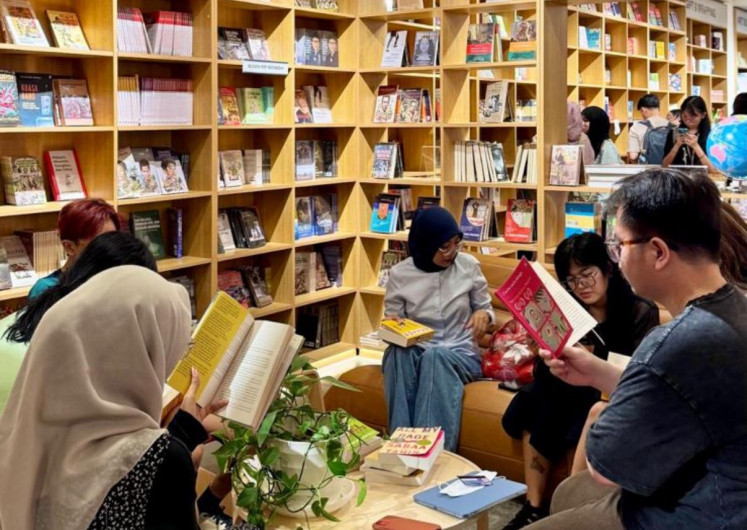Popular Reads
Top Results
Can't find what you're looking for?
View all search resultsPopular Reads
Top Results
Can't find what you're looking for?
View all search resultsAustralians, reporting on Indonesia
For the last 70-or-so years, Indonesia and Australia have been in a dynamic relationship, frequently punctuated by tensions
Change text size
Gift Premium Articles
to Anyone
For the last 70-or-so years, Indonesia and Australia have been in a dynamic relationship, frequently punctuated by tensions.
The nations have often gone head to head in disputes, such as during the alleged wire tapping incident several years ago. However, the countries have also stood together, as in the aftermath of the Bali bombings.
However, Australian and Indonesian journalists have always been at the ready to deliver factual reports that might affect either nation.
Looking to explore how our southern neighbors have reported on Indonesia, Ross Tapsell, a lecturer in Asian Studies at the Australian National University (ANU), recently launched his book, titled By-lines, Balibo, Bali Bombings: Australian Journalists in Indonesia.
The work, which sprang out of Tapsell's doctoral research in 2005, highlights important news events that affected relations between the countries, such as the Balibo Five and the Bali bombings.
Tapsell offers profiles and stories of foreign correspondents stationed in Indonesia during the early 1940s and the tumultuous 1960s. He goes into detail on how local staff works with foreign publications, how governments influence the reporting process and the impact of new technology.
'This book is about the Australian media in Indonesia. It's actually a history of Australian journalism in Indonesia since the Indonesian independence of 1945,' Tapsell told The Jakarta Post during the book's launch in Cikini, Central Jakarta, recently.
Ross Tapsell
'I went back and looked at a lot of documents and reports,' he said. 'They often said that the biggest problem in the bilateral relationship was the Australian media ' that the Australian media often deliberately destabilized the relationship.'
Tapsell interviewed several Australian journalists previously stationed in Indonesia, such as Tony Rafty, a cartoonist who came to Jakarta in 1945 after independence to draw pictures of then-president Sukarno.
Rafty 'actually went straight to the palace and knocked on the door and said 'Can I speak to Sukarno?'' Tapsell said. 'They let him in and he drew pictures of Sukarno and Hatta and the first Cabinet.'
Sukarno was so happy with Rafty's work that they stayed close friends.
Initial good relations with the Indonesian government soured, particularly after the Balibo Five incident in 1975, when five Australian journalists were killed while reporting in Timor Leste, which was then occupied by Indonesia.
Tapsell says that the Indonesian government believes many Australian journalists have maintained a 'vendetta' against Indonesia ever since.
Tensions also rose when David Jenkins wrote a headline article for the Sydney Morning Herald about corruption in Soeharto's New Order.
Jenkins, once considered one of Indonesia's best friends in the Australian press, called Soeharto's wife, Tien Soeharto, 'Madame Tien Percent', suggesting that she always received a 10 percent commission from whatever projects were taking place under the New Order.
In response, the Indonesian government barred Australian journalists from entering the nation for years.
Tapsell, however, downplayed the incident, saying that Australians had typically faced many challenges reporting on Indonesia during the New Order.
'It was a difficult time. There were a number of threats, intimidations, violence and restrictions ' particularly in outer regions like Papua and Timor,' he said. 'Getting information during the Soeharto years was very difficult because of the way the bureaucracy worked and the closed off nature of New Order.'
'Then there was reformasi and kebebasan pres [press freedom] and suddenly Indonesia was a wonderful place for access with the exception of Papua. What has been interesting is that, over time, the Australian government has become more closed off and journalists now complain that the Australian government manages their media more tightly.'
Constant suspicions and restrictions imposed by both governments on the work of journalists has also made it difficult for Australians to understand their northern neighbor, according to Tapsell.
'A lot of [Australians] still think of Indonesia as a place for terrorism and military dictatorships,' he says. 'Of course, we only hear bad news about Indonesia in Australia.'
Tapsell said he hoped his book would improve understanding between Australians and Indonesians and provide a different perspective on the dynamics of their relations.
'In Australia there is a lack of credible information,' Tapsell says. 'We don't learn much about Indonesia. Indonesian language in Australia has been in decline since the 1970s. Unfortunately, our educational knowledge about Indonesia is very limited. We are relying on mainstream media to get information about Indonesia and the mainstream is always limited and restricted.'
------------
This article corrected Tapsell's quote about a vendetta.












